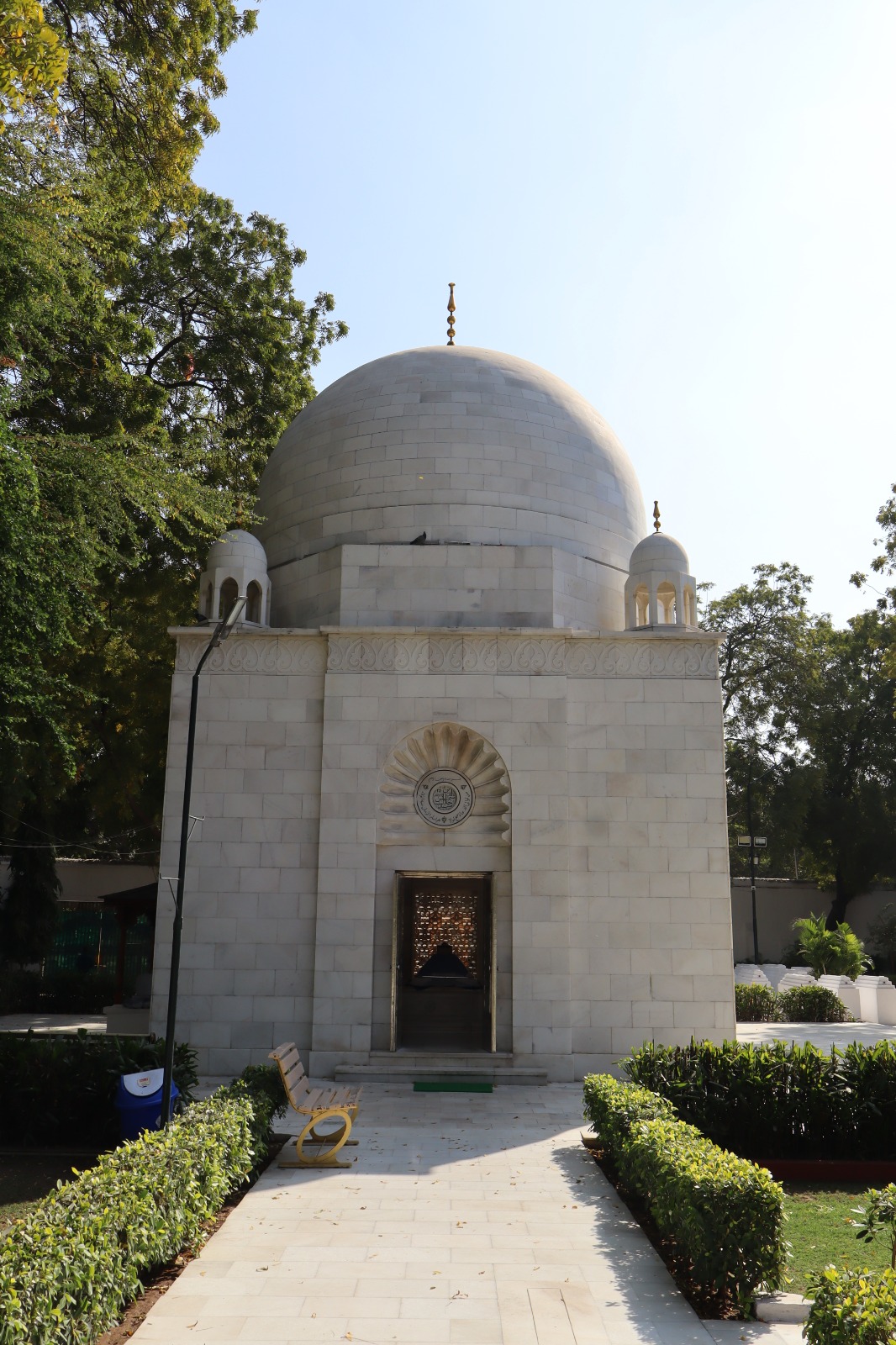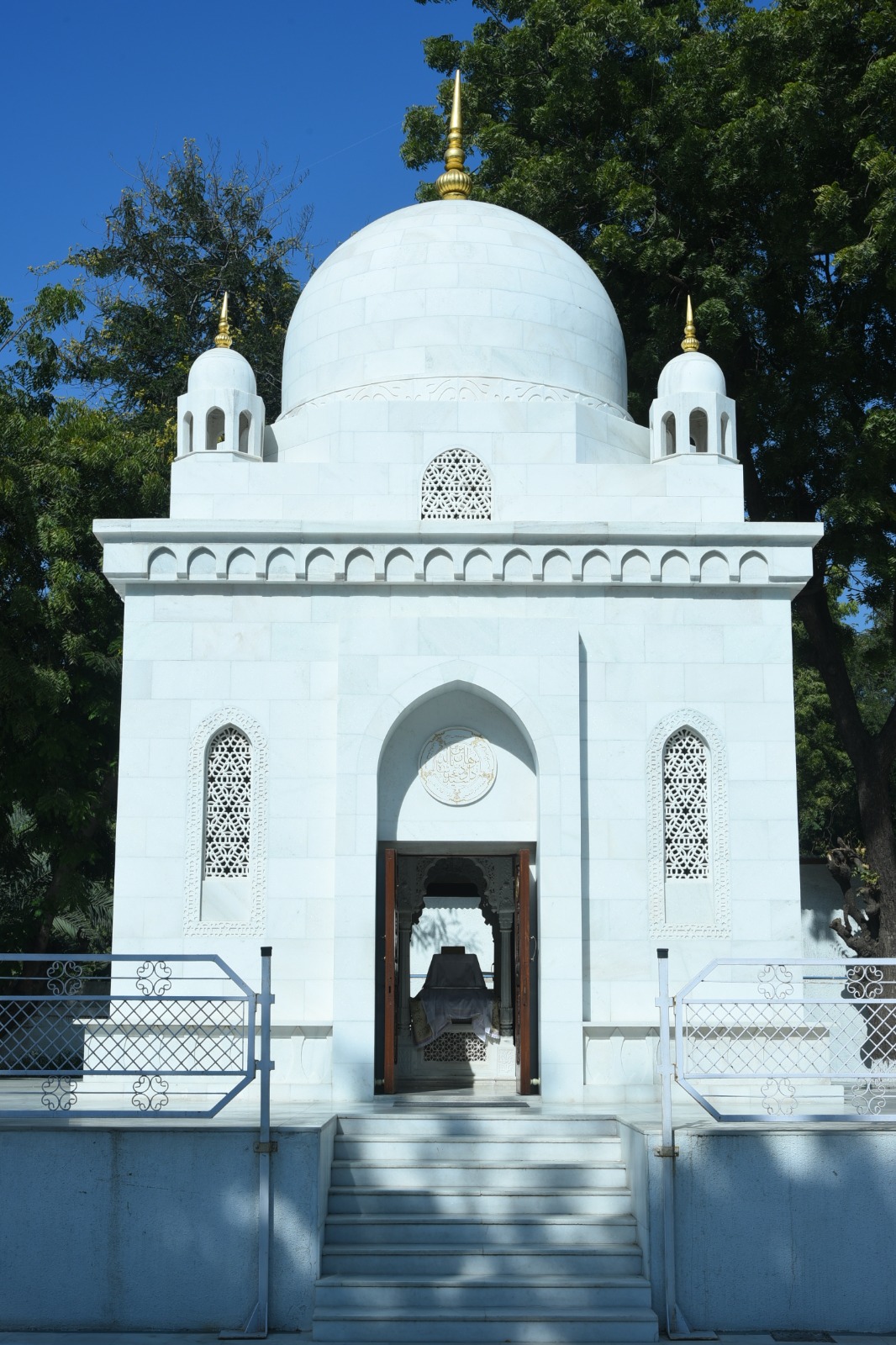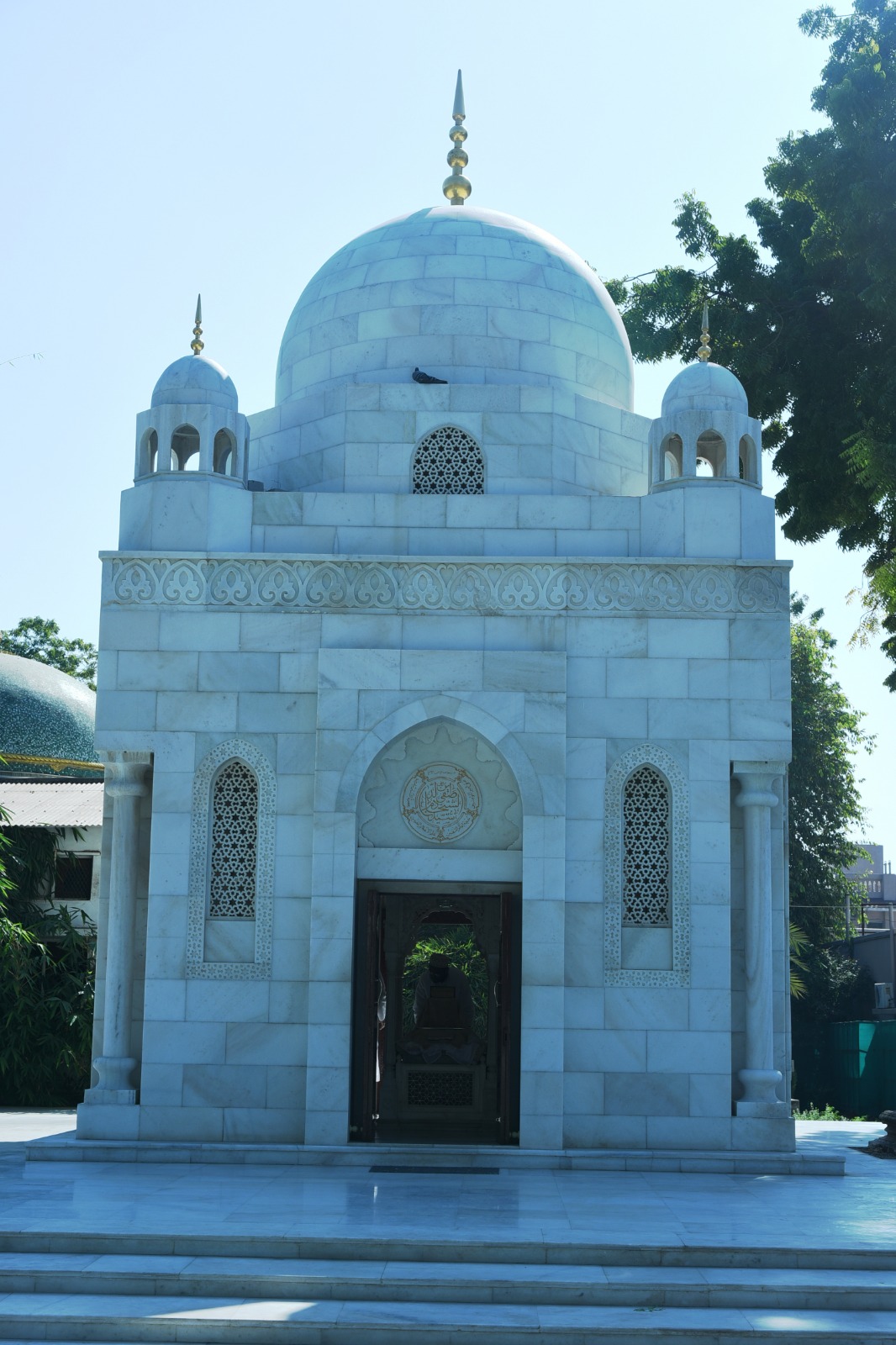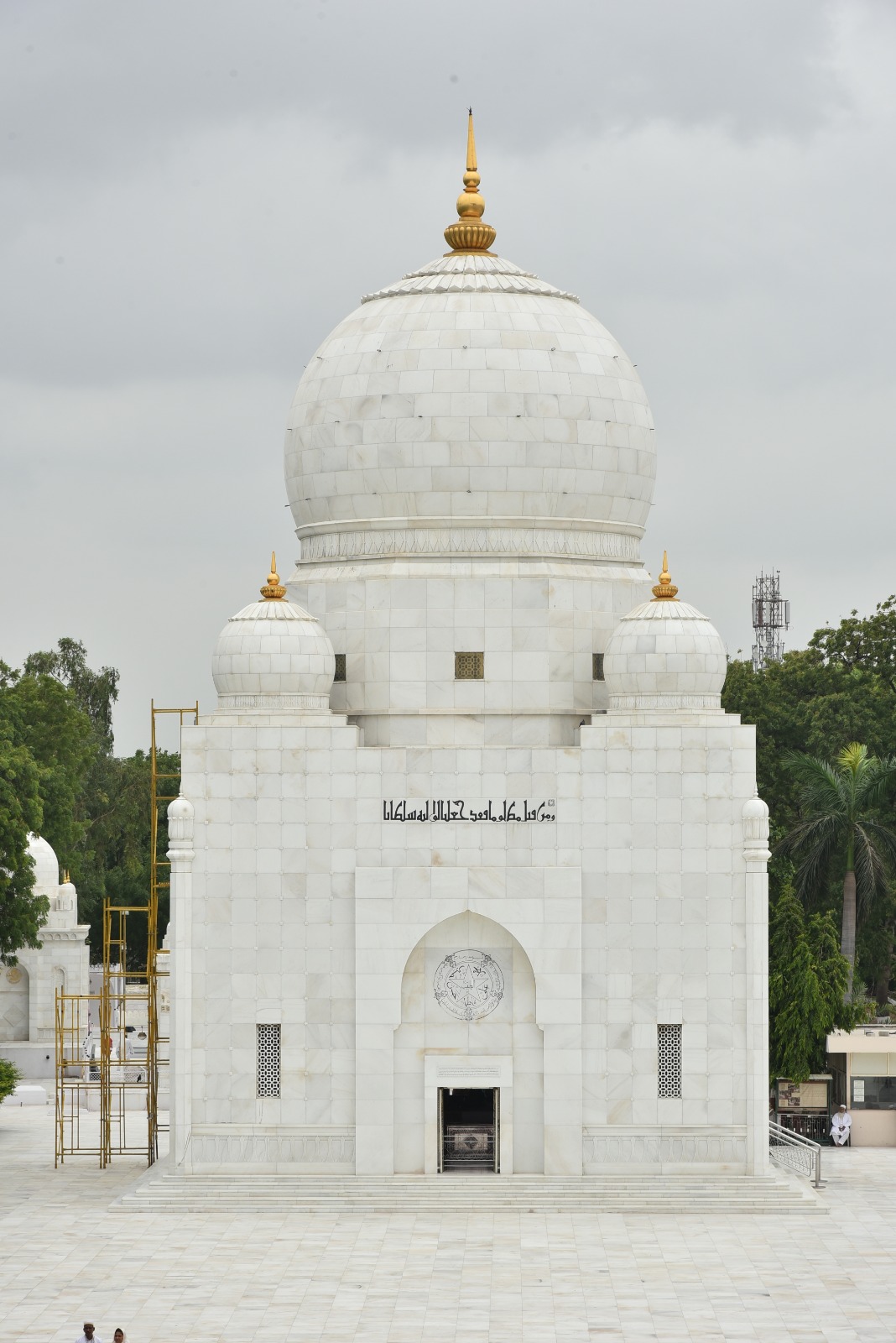Duat Mutlaqeen

25th Al- Dai Al- Mutlaq - Syedna Jalal ShamsuddinR.A
Syedna Jalal ShamsuddinR.A, known for his dedication to learning, journeyed to Yemen for higher education. He served with sincerity and devotion under Syedna Mohammed IzzuddinR.A and later received teachings from Syedna Yusuf NajmuddinR.A, who appointed him as his assistant. In Ahmedabad, Syedna Jalal remained steadfast during times of hardship, providing shelter despite financial challenges. He ensured financial aid reached Yemen during critical periods, displaying immense care for his community's welfare. When appointed as the successor, his tenure as the spiritual leader was brief but impactful. His foresight in choosing his successor, Syedna Dawood bin Ajab ShahR.A, and His subsequent successor Syedna Dawood bin Qutub ShahR.A, was guided by the will of Imam uz Zamaan. His legacy lives on through a beautiful marble mausoleum dedicated by the 52nd dai, Syedna Mohammed Burhanud-dinR.A.
26 th Al- Dai Al- Mutlaq - Syedna Dawood bin Ajab Shah BurhanuddinR.A
Born in 1523, Syedna Dawood bin Ajab ShahR.A journey to Yemen for advanced studies after early education in Ahmedabad. Recognized for his noble qualities by Syedna Yusuf Najmuddin R.A, he returned to serve with dedication under Syedna Jalal ShamsuddinR.A , who appointed him as his successor. Amid adversity in Ahmedabad, Syedna Dawood R.A traveled to Baroda to ensure his followers' safety, facing challenges including persecution and threats. His guidance in Kapadwanj inspired steadfastness among his followers. Known for his efforts in restoring religious freedoms, he garnered support from Emperor Akbar, enabling followers to practice openly. His tenure witnessed the reclaiming of lost fortresses in Yemen and the recovery of precious lost manuscripts. He was succeeded by Syedna Dawood bin Qutub Shah R.A and held the laqab 'Burhanuddin,' meaning ' the proof of Deen'


27th Al- Dai Al- Mutlaq - Syedna Dawood bin Qutub Shah Burhanuddin R.A
Syedna Dawood bin Qutub ShahR.A was a highly respected and knowledgeable religious leader. He was born in 1539 and had a strong upbringing in Islamic teachings. Syedna DawoodR.A had a deep understanding of the Quran and was known for his wisdom. He traveled to Yemen to gain further knowledge and spent four years there. Upon returning to India, he married and had children. Syedna DawoodR.A served as a loyal and dedicated assistant to his predecessor. After his predecessor's passing, Syedna DawoodR.A became the leader of the Dawat. Emperor Akbar was captivated by Syedna Dawood's R.A presence and recognized him as the true leader. The emperor granted him special privileges and gifts. People of different religions highly regarded Syedna Dawood's influence and teachings.
28th Al- Dai Al- Mutlaq - Syedna Al Shaikh Adam Safiyuddin RA
Syedna Shaikh Aadam Safiyuddin RA, born in 1548, demonstrated a thirst for knowledge from a young age. His journey for education led him from Baroda to Yemen under Syedna Yusuf Najmuddin'sR.A guidance. Back in India, he selflessly served Syedna Dawood bin Ajab ShahR.A, and was honored for his dedication. During a challenging time in Sidhpur, he imparted knowledge with clarity, affirming the rightful succession publicly. Facing increasing hostilities, he endured immense suffering and even mistreatment during captivity. Despite the turmoil, he tirelessly imparted religious teachings, offering guidance to the community. His succession marked a legacy of commitment to faith, known as 'Safiyuddin'—the Ever-Refined in matters of Deen.


29th Al- Dai Al- Mutlaq - Syedna Abdut-Taiyib ZakiyuddinR.A
Syedna Abdut-Taiyib ZakiyuddinR.A, born in 1564, was a remarkable individual known for his unwavering dedication and service to his father, the 27th Dai Syedna Dawood bin QutubShahR.A, during a turbulent period. Despite facing challenges, Syedna ZakiyuddinR.A remained steadfast and was appointed as Mazoon by Syedna Shaikh Adam R.A. After the passing of Syedna Shaikh AdamR.A, Syedna ZakiyuddinR.A led the funeral prayers and accepted condolences, even from Ali bin Ibrahim, who later strayed from the path. Syedna ZakiyuddinR.A forgave Ali and appointed him as second in command, but Ali's inconsistent behavior and desire for power led to a rift in the community. Ali and his followers petitioned against Syedna ZakiyuddinR.A, but the Mughal emperor recognized Syedna ZakiyuddinR.A as the rightful leader and urged Ali to reconcile. However, Ali eventually seceded from the community and formed his own sect.
31st Al- Dai Al- Mutlaq - Syedna Qasimkhan Zainuddin RA
Syedna Qasim khan ZainuddinR.A succeeded Syedna Ali ShamsuddinR.A, bringing the leadership of Dawat back to Hind after a brief period in Yemen. His lineage is traced back to esteemed ancestors like Maulaya AbdullahR.A and Syedi Hasan Feer Shaheed QR, significantly contributed to establishing Dawat in India centuries ago. Syedna Qasim KhanR.A tirelessly served five predecessors, receiving honors from the 27th Dai Syedna Dawood bin Qutub-ShahR.A and holding pivotal positions within Dawat. Enduring the trials of Sulaiman's upheaval, he steadfastly maintained his commitment. Before his passing, he passed on the leadership to Syedna Qutub Khan Qutbuddin ShaheedR.A, leaving a legacy as 'Zainuddin,' an adornment to Deen. His resting place remains at Mazare-Qutbi in Ahmedabad.


32nd Al- Dai Al- Mutlaq - Syedna Qutub Khan Qutbuddin Shaheed R.A
Syedna Qutubkhan Qutbuddin Shaheed R.A holds a significant place in the history of Dawat. He attained martyrdom while defending the faith, similar to the sacrifice of Imam Husain A.S in Karbala. Amongst the Doat Mutlaqeen R.A, Syedna Qutbuddin R.A stands out for this distinction. His martyrdom was prophesied by Rasulullah SAW himself, with the date and place specified by hudood. Even his father, the 27th dai Syedna Dawood bin Qutub-Shah R.A, predicted that his son would attain martyrdom in defense of Imaan. Born on 30th Zilqadat il-Haraam 985/1578, Syedna Qutbuddin R.A faced a grave illness in his childhood. His mother, Raani Aai Saheba binte Alibhai, prepared his kafan, believing he would not survive. However, upon seeing the kafan, Syedna Dawood R.A proclaimed that their son would not only live but also ascend to the position of al-Dai al-Mutlaq and attain martyrdom. Syedna Qutbuddin R.A served his predecessors with utmost dedication and devotion. He accompanied his father to the court of Emperor Akbar in Lahore during Sulaiman's rebellion. He received haddiyat from the 28th dai, Syedna Shaikh Adam Safiyuddin R.A, and was elevated to the rank of Mazoon by his immediate predecessor, Syedna QasimKhan Zainuddin R.A. The laqab of Syedna Qutbuddin, meaning 'the Pivot of deen', reflects his significance in the Deen.
33rd Al- Dai Al- Mutlaq - Syedna Feer Khan Shujauddin R.A
Syedna FeerKhan ShujauddinR.A, a religious leader, faced persecution during Mughal rule. Despite hardships and captivity, his piety and resilience impressed even his oppressors. After his release, conflicts arose, including false accusations of demanding money. Syedna FeerKhan's steadfastness prevailed, and he reaffirmed his successor. The sect of dissidents, called 'Hujumiya,' aimed to tarnish his image but failed. Syedna FeerKhan RA's journey included enriching interactions, leaving a lasting legacy of faith and fortitude. His passing in 1065 marked the end of an era, but his teachings continue to inspire.


49th Al- Dai Al- Mutlaq - Syedna AbdulHusain Husamuddin RA
Syedna AbdulHusain Husamuddin RA, inheriting the Dawat at 63, was born in Aashura in 1239H. Raised by his brother Syedna AbdulQadir Najmuddin RA, he grew to be an erudite scholar under Syedi AbdeAli Imaduddin QR's tutelage. Despite initial doubts about his knowledge, Syedna Husamuddin's eloquence and wisdom were evident when he seamlessly continued discourse in Imaduddin QR's absence. Known for his profound grasp of spiritual truths, he conducted extensive travels, guiding mumineen away from superstitions. He managed the financial burdens incurred during his predecessors' reigns. Establishing the Faiz-e-Husaini Trust, he facilitated pilgrimages, showcasing immense devotion and leadership throughout his tenure.